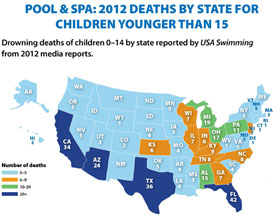26 children drown in pools and spas during the week of July 4th, on average
 WASHINGTON, D.C. – In anticipation of the thousands of gatherings around public and private pools over the Independence Day holiday, the U.S. Consumer Product Safety Commission (CPSC) is reminding parents and children alike of the steps they should take to stay safe when spending time in the water.
WASHINGTON, D.C. – In anticipation of the thousands of gatherings around public and private pools over the Independence Day holiday, the U.S. Consumer Product Safety Commission (CPSC) is reminding parents and children alike of the steps they should take to stay safe when spending time in the water.
The July 4th holiday has traditionally seen an increase in the number of pool and spa drownings, compared to an average week over the rest of the summer. According to data compiled from media reports by USA Swimming, during the last three years over the week of July 4th an average of 26 children drowned in pools and spas. In 2012, 30 pool or spa-related drownings were reported involving children younger than 15 over the week of the July 4 holiday (June 30 through July 6); in 2011, there were 25 drownings reported; and in 2010, 24 drownings for the same age range.
“I want families and friends to enjoy their time together in and around the pool during the July 4th holiday,” Chairman Tenenbaum said. “But if past years are any guide, unless we all follow the simple safety steps around the pool, more than two dozen families will suffer a tragic loss during the week of Independence Day.”
“Teach your children how to swim, put a fence around the pool and designate a Water Watcher--an adult who knows how to swim to watch the children in and around the water at all times,” added Chairman Tenenbaum.
Annually, CPSC reports that nearly 300 children under the age of five drown in a pool or spa and another 5,100 children under the age of 15 go to hospital emergency rooms for near-drowning injuries. Children between the ages of 1 and 3 and African American children between the ages of 5 and 19 are most at risk of drowning.
CPSC’s Pool Safely campaign (PoolSafely.gov) is a national public education effort to reduce child drownings, near-drownings and entrapments in swimming pools and spas. For the second year, the campaign is focusing on populations most at risk of drowning.
CPSC reminds all families to take the following steps to ensure that their time at the pool is safe for everyone – not just during the July 4th holiday, but all year long:
Staying Close, Being Alert and Watching Children in and Around the Pool
- Never leave a child unattended in a pool or spa and always watch your children closely around all bodies of water. Designate a water watcher to supervise children in the pool or spa. This person should not be reading, texting, using a smart phone or otherwise distracted. Adults can take turns being a Water Watcher.
- Teach children basic water safety tips.
- Keep children away from pool drains, pipes and other openings to avoid entrapments.
- Have a telephone close by when you or your family are using a pool or spa.
- If a child is missing, look for him or her in the pool or spa first.
- Share safety instructions with family, friends and neighbors.
Learning and Practicing Water Safety Skills
- Learn how to swim and teach your child how to swim.
- Learn how to perform CPR on children and adults, and update those skills regularly.
- Understand the basics of life-saving so that you can assist in a pool emergency.
Having the Appropriate Equipment for Your Pool or Spa
- Install a four-foot or taller fence around the perimeter of the pool and spa and use self-closing and self-latching gates; ask your neighbors to do the same at their pools.
- Install and use a lockable safety cover on your spa.
- If your house serves as a fourth side of a fence around a pool, install and use a door or pool alarm.
- Maintain pool and spa covers in good working order.
- Ensure any pool and spa you use has drain covers that comply with federal standards, and, if you do not know, ask your pool service provider whether your covers are in compliance.
- Have lifesaving equipment such as life rings, floats or a reaching pole available and easily accessible.
About the U.S. CPSC
The U.S. Consumer Product Safety Commission (CPSC) is charged with protecting the public from unreasonable risk of injury or death associated with the use of thousands of types of consumer products. Deaths, injuries, and property damage from consumer product-related incidents cost the nation more than $1 trillion annually. CPSC's work to ensure the safety of consumer products has contributed to a decline in the rate of injuries associated with consumer products over the past 50 years.
Federal law prohibits any person from selling products subject to a Commission ordered recall or a voluntary recall undertaken in consultation with the CPSC.
For lifesaving information:
- Visit CPSC.gov.
- Sign up to receive our e-mail alerts.
- Follow us on Facebook, Instagram @USCPSC and Twitter @USCPSC.
- Report a dangerous product or a product-related injury on www.SaferProducts.gov.
- Call CPSC’s Hotline at 800-638-2772 (TTY 301-595-7054).
- Contact a media specialist.
Please use the below phone number for all media requests.
Phone: (301) 504-7908
Spanish: (301) 504-7800
